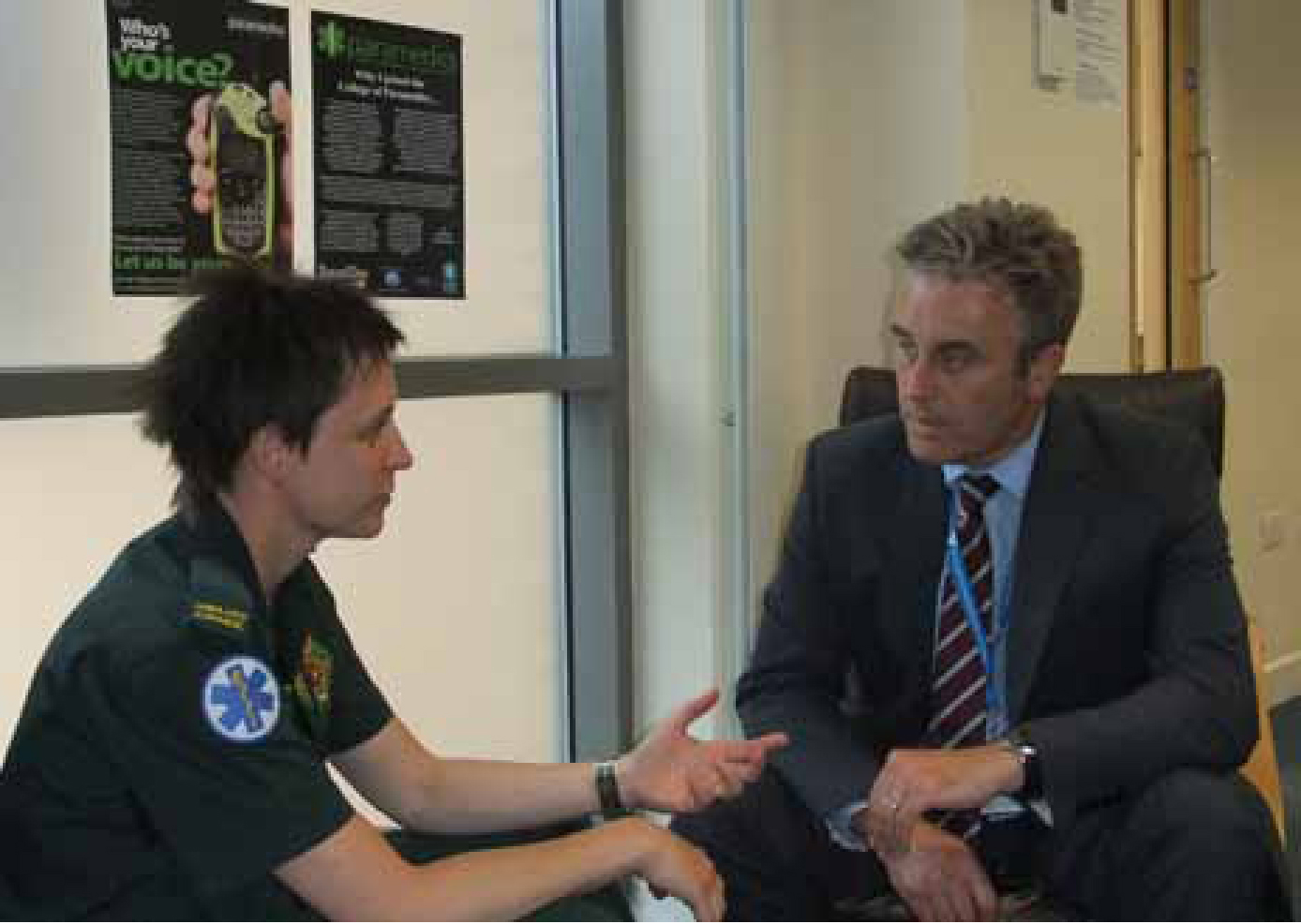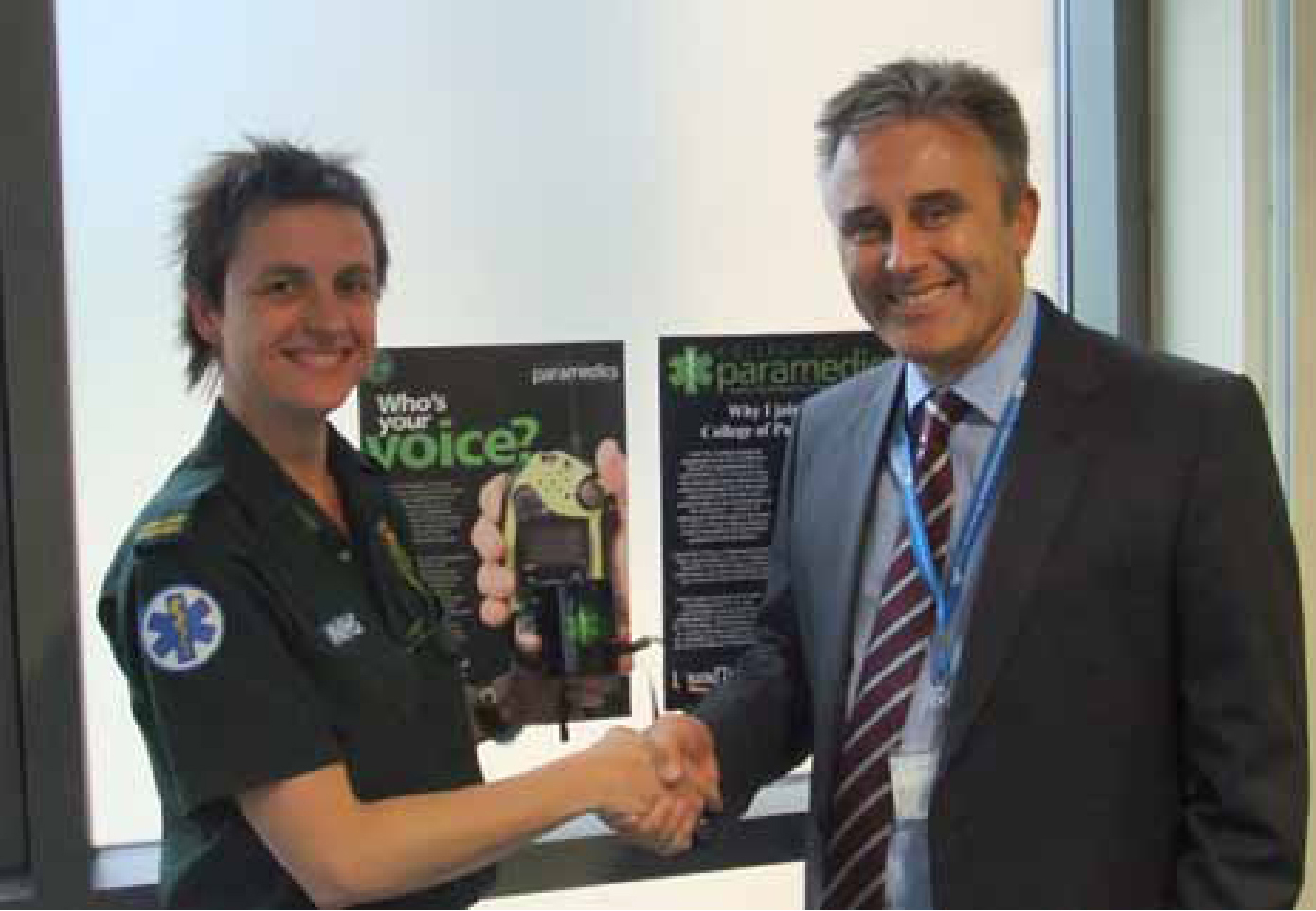David Whiting is a registered paramedic with over 30 years’ experience in the ambulance service, starting his career as a cadet with South Yorkshire Ambulance Service. Since then David has worked for East Midlands, West Midlands and Great Western Ambulance Services in a variety of roles.
Liz Harris is the College of Paramedics’ Yorkshire Region Council member and a paramedic with the Yorkshire Ambulance Service (YAS); she asks David Whiting why he joined the College of Paramedics and some other questions about the paramedic profession (Figure 1).

What were your reasons for joining the College of Paramedics?
I wanted to help to raise the profile of this important membership organisation that is focused on developing the paramedic profession. As a registered paramedic, I believe the College is best placed to lead on the development of the paramedic profession, particularly relating to raising the profile of paramedics, developing the curriculum and in delivering continuing professional development through a range of activities. I am also keen on a personal level to access the CPD opportunities to help in maintaining my registration.
In what ways would you like to see the paramedic profession developing in the future?
I am keen to see the curriculum continue to develop in a way that better reflects the case mix staff see operationally. When I qualified as a paramedic the emphasis was on emergency care and related interventions. The majority of patients paramedics come across have urgent care needs and present with complex health and social care needs, and it's therefore important that our education programmes recognise the needs of those we care for. I would like to see greater consistency in advanced paramedic roles, rather than the patch work quilt of roles that exists nationally. I would like to see commissioners recognising the value that paramedics can bring in the urgent care setting and I would like to see more integrated models of care that utilise paramedic skills and experience. I also welcome the development of paramedics in critical care skills, such as our air paramedics, which will support our ambition to increase the trauma capability on the Yorkshire Air Ambulance (YAA) aircraft and develop our Enhanced Care Team concept.
What is your opinion on Ambulance Service Foundation Trusts (FT) not having a mandated paramedic presence at Board level?
Should the FT rules change then this is something that all Trusts would consider. I don't believe this necessarily constrains us at this time. We need to ensure that paramedics in the future play an important role in the shaping of services, and through more effective engagement in key aspects of work and clinical work streams where paramedics can make an effective contribution. In YAS we recognise there needs to be a stronger strategic voice for paramedics and that is why we will be developing our first paramedic consultant role to support YAS in developing the profession for the benefit of patients.
What has Yorkshire Ambulance Service got to offer as an employer?
In terms of attracting and retaining clinicians, I believe YAS has a great deal to offer. Firstly, our geography is diverse and has something for everyone, from our busy, vibrant cities, to the wilds of North Yorkshire. Secondly, we in YAS have made a commitment to developing more paramedics over the following five years and a commitment to developing more advanced paramedics, creating more opportunities for those that wish to progress. YAS has opportunities for paramedics who wish to develop themselves, whether that is more through the urgent care route as a paramedic practitioner or emergency care practitioner, as a clinical leader working as a clinical supervisor or as a specialist paramedic in the HART team or as part of the air paramedic crew with YAA. These opportunities in YAS are relatively new given the paramedic profession is still less than 30 years old.

What is Yorkshire Ambulance Service doing to promote the paramedic profession?
We are involved in a number of areas of work that support the development of paramedics, both locally and nationally. Locally we are starting to support more actively the College of Paramedics, and nationally supporting the lead paramedic group, which currently feeds in to the National Ambulance Medical Directors group (NASMeD). This allows the paramedic profession to work alongside our medical directors, using their expertise and understanding of the paramedic role to shape service developments. In YAS we have secured a university based programme to develop our paramedics of the future, and made an organisational commitment to increase paramedic numbers and advanced paramedic roles.
In the light of the Francis Report what can Ambulance Trusts do to meet some of the recommendations around improving patient care?
It is crucial that we learn those important lessons arising out of the two public inquiries in to Mid Staffordshire hospitals. We need to ensure that patients are put first and we have a clear focus on caring values. We need to foster a culture of patient centered professionalism and underpin this with effective clinical leadership and supervision. This is important to ensure that standards of care are maintained and compassion for patients is all of our responsibilities. Equally when we get things wrong, it is crucial that we are open and transparent with patients and their carers, and families. We then need to learn from our mistakes and make sure these are not repeated. More than anything else we must find better ways in which to listen to our patients. In YAS, our new clinical supervisors have a pivotal role to play in supporting staff, maintaining standards, and coordinating clinical care. These are not complex issues, but we must all play our part from clinicians to leaders in our organisations, to ensure that patients are treated to the best of our abilities, and treated with dignity and respect. I have been encouraged in the time I have spent in the ambulance service, we have very dedicated, committed and passionate people who do put patients first and this is a real strength for the ambulance service both locally and nationally.
The College of Paramedics is involved in many issues that are regarded as being important to the profession, such as raising the entry level into the profession from certificate level and obtaining prescribing rights for paramedics in-line with other healthcare professionals. What would you regard as an important issue for the profession?
I think a key challenge is convincing paramedics of the benefits in joining the College of Paramedics, to provide the College with a substantial membership base to then have that louder voice from which to influence and lobby for the profession.
I would like to thank David for taking the time to answer my questions and of course for joining the paramedics’ professional body. I am really pleased that David has joined the College of Paramedics, I think it sends a clear message from the top of the organisation that YAS is fully aware of the important issues affecting paramedic practice and that it supports the development of the profession. In addition, YAS has recently added ‘College of Paramedics member’ as a desirable criteria in their paramedic job description. The College certainly does all that has been mentioned above and does it very passionately. Paramedics often ask about what benefits they will get for joining, there are indeed many but for me it is about the intangible benefits, it is about raising the profile and credibility of the profession so that we can gain control of our profession and clinical practice and stand as equals alongside other healthcare professionals. If we can all encourage the senior leaders of our organisations to join the College as well as our colleagues in the mess room the voice and power of our professional body will continue to gain strength on our behalf.
